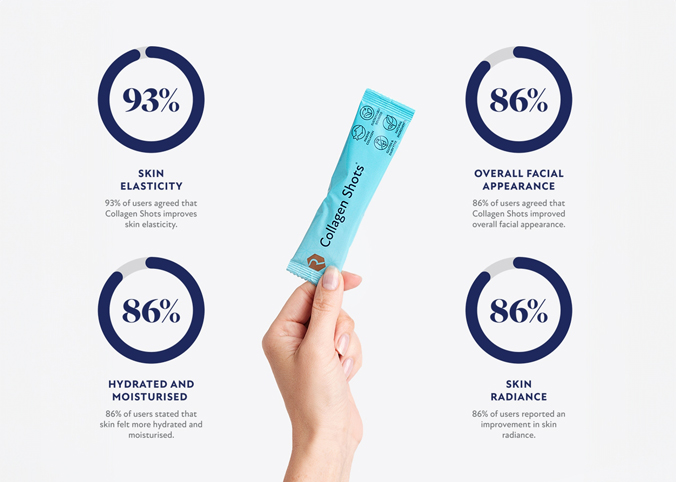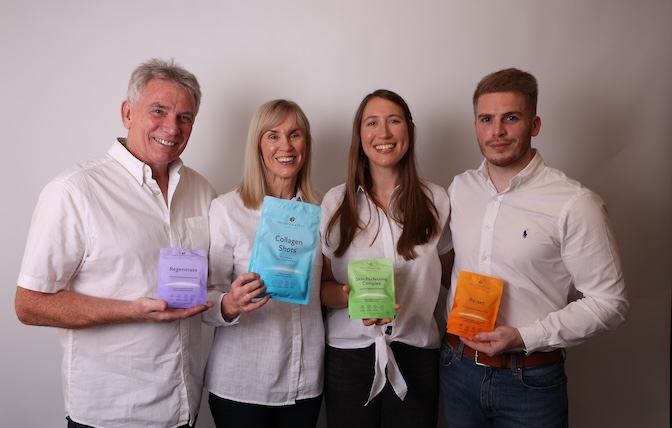Signs you have a collagen deficiency

Collagen proteins are essential structural building blocks for your body. Unfortunately, collagen levels lower as you age, and external factors further hinder the problem.
While you can get some collagen through the right diet, your body may begin to show signs of low collagen. The impact it has on your appearance is one of the main reasons people opt for collagen supplements.
What is a collagen deficiency?
Although everybody’s collagen levels deplete as we age, not everybody will experience a deficiency, which is when your body doesn’t have enough of the protein to function correctly. This means that you’ll experience the impact much more severely and earlier on in life.
Therefore, it’s essential to understand what affects collagen production and when you need to take action to boost your levels. For example, refined sugars or carbohydrates, prolonged UV ray exposure and smoking will cause further depletion.
How do you know if you have a collagen deficiency?
There are six main symptoms of collagen deficiency you should look out for:
- Wrinkles
- Slow muscle recovery
- Gastrointestinal problems
- Thin or flat-looking hair
- Joint pain
- Slow injury recovery
Let’s take a look at these in more detail.
Wrinkles
Wrinkles are caused by your skin losing elasticity, a direct result of collagen loss. While wrinkles don’t necessarily mean a deficiency, this could be a symptom if you find them in your twenties. This is because 70-80% of your skin consists of collagen. Therefore, a deficiency means your body won’t be able to repair itself as quickly, as any collagen produced will be focused on wound healing or assisting your vital organs.
Slow muscle recovery
If you are an active person who exercises regularly, you’ll be familiar with the aches and pains that come with muscle recovery. Collagen works to repair your muscles and also helps with muscle flexibility.
A deficiency will not only contribute to longer muscle recovery time, but it could also result in you losing muscle mass.
Gastrointestinal problems
Leaky gut syndrome, in particular, is linked to a collagen deficiency. Your intestines have tight junctions, which help you absorb nutrients. However, a leaky gut means that other particles can slip through the gap, causing infection and inflammation.
Collagen plays a significant role in repairing intestinal walls. Therefore, having enough collagen in your body is essential to rebuilding these damaged tight junctions.
Thin or flat-looking hair
Collagen is present in your hair follicles, which deliver essential nutrients for healthy hair. Like wound healing, a collagen deficiency means that this delivery is much slower, leading to your hair looking thinner and duller.
More than that, a collagen deficiency means that your body can’t fight off free radicals as well as it did before, and this can result in the texture of your hair being destroyed, further contributing to thinner hair that is less glossy.
Joint pain
As with wrinkles, joint pain is often thought of as one of the side effects of getting older. However, the cartilage in your joints is rebuilt and repaired by collagen; therefore, your discomfort could be a sign of a deficiency.
Collagen also provides flexibility and cushions your joints. So, if your body doesn’t have enough, it will be more vulnerable to damage.
Slow injury recovery
When you suffer an injury, your body produces collagen in the affected area to repair the damaged tissue. If you find that your body takes longer to heal than usual, you may have a collagen deficiency.
How do you restore collagen in your body?
Unfortunately, once your body starts to produce less collagen, there’s no way to encourage it to begin making the levels it once did. Therefore, you have to find alternate ways to get enough collagen[1] into your system.
You can do this by eating more collagen-rich foods or taking collagen supplements. Additionally, we recommend reducing your exposure to UV rays and the amount you smoke.
Read the results of Rejuvenated's Collagen Shots clinical study
In a 2024 clinical study conducted under dermatologist supervision, Rejuvenated Collagen Shots were shown to significantly improve skin quality in just 60 days of daily use. Here are the key results:
-
Skin elasticity improved by 20%
-
Skin hydration increased by 7%
-
Wrinkle depth reduced by 4%
-
Wrinkle length reduced by 19%
-
Wrinkle width reduced by 8%
-
Skin radiance improved by 1%
Importantly, 100% of participants experienced no adverse reactions, and the product was found to be safe and well tolerated by all subjects. The study also confirmed subjective improvements in skin appearance, nail strength, hair health, and even sleep quality.
These results demonstrate that Rejuvenated Collagen Shots not only replenish declining collagen levels but also help restore the youthful appearance and resilience of your skin — a true ally in addressing collagen deficiency from within.
Rejuvenated has been creating natural, sustainable, gluten-free supplements for almost twenty years. All of our formulas have been made with the help of nutritional food production scientists.






